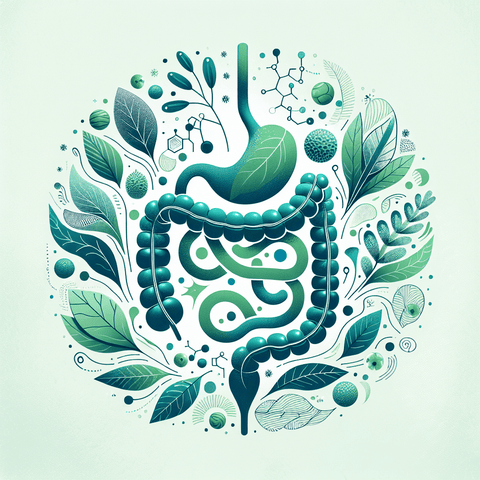Introduction
In our modern society, maintaining optimal health involves more than just a balanced diet; it often requires a conscious effort to understand the intricate relationships between nutrients and bodily functions. Nutritional supplements have gained popularity as convenient tools to bridge dietary gaps and support overall well-being. Among these, vitamin B12 is recognized as a vital nutrient necessary for numerous physiological processes. While traditionally associated with nerve health and blood formation, emerging scientific research highlights a more nuanced role: its influence on gut health and digestion.
The human gastrointestinal (GI) tract is a complex ecosystem where numerous factors interplay—diet, microbiota, immune response, and nutrient absorption—all working in harmony to sustain health. Recent studies suggest a compelling connection between vitamin B12 status and gut microbiota composition, hinting at a hidden link that could unlock new strategies for digestive wellness. This post aims to delve deep into this connection, exploring how vitamin B12 influences our gut microbiome and overall digestive function, and how targeted supplementation may foster better gut health.
Vitamin B12: A Vital Nutrient for Overall Health and Well-being
Vitamin B12, also known as cobalamin, is a water-soluble vitamin essential for human health. It plays a critical role in DNA synthesis, red blood cell formation, and neurological functions. Its involvement in converting homocysteine into methionine is vital for maintaining proper cardiovascular health, while its support of nerve cell integrity safeguards functions such as cognition and sensory coordination. Without sufficient B12, these fundamental processes may falter, leading to fatigue, neurological disturbances, and other health issues.
Dietary sources of vitamin B12 are primarily animal-based foods, including meat, seafood, eggs, and dairy products. Vegetarians and vegans are at higher risk of deficiency because plant-based diets typically lack adequate B12. Therefore, supplementation becomes necessary to meet daily requirements—especially for those with restricted diets or specific health conditions that impair absorption. It is estimated that about 1.5% to 15% of the population has some degree of B12 deficiency, often due to inadequate intake, malabsorption, or gastrointestinal disorders.
Ensuring adequate B12 levels can optimize energy levels, support nerve health, and promote hematopoiesis. Additionally, supplementing B12 can be particularly beneficial for individuals at risk of deficiency, including older adults, pregnant women, and those with gastrointestinal diseases such as atrophic gastritis or celiac disease. Supplementation options include oral tablets, sublingual forms, or injections, designed to bypass absorption barriers and deliver B12 directly into systemic circulation.
B12 Deficiency and Its Impact on the Gut Microbiome
The gut microbiome, comprising trillions of microorganisms inhabiting our digestive tract, is fundamental to our health. These microbes aid in digesting food, synthesizing vitamins, modulating immune responses, and maintaining the integrity of the gut barrier. The composition and diversity of this microbial ecosystem are crucial indicators of digestive health; disruptions can lead to dysbiosis, characterized by an imbalance of beneficial and harmful bacteria.
Emerging evidence indicates that B12 deficiency can significantly impact the gut microbiota. B12 serves as a cofactor for bacterial enzymes involved in their metabolic pathways, including those synthesizing essential compounds. When systemic B12 levels are low, the synthesis of certain bacterial metabolites may be impaired, leading to a shift in microbial composition. Studies show that B12 deficiency often correlates with decreased microbial diversity and an overgrowth of pathogenic or opportunistic bacteria—contributing to gastrointestinal discomfort, bloating, and irregular bowel movements.
Furthermore, a disrupted microbiome can perpetuate B12 deficiency, creating a feedback loop that exacerbates digestive issues. For example, *Clostridium* species are known to produce B12 endogenously, but their relative abundance can decrease in dysbiotic states. Conversely, bacteria that consume B12 can further deplete the host’s stores, impairing absorption and metabolic functions. Supplementation with B12 may help restore microbial balance by supporting beneficial bacteria that depend on B12 synthesis, thereby promoting a healthier microbiome conducive to effective digestion.
B12 Absorption and Digestion: Key Processes for Optimal Nutrient Uptake
The process of absorbing vitamin B12 is intricate and highly dependent on a series of physiological steps within the gastrointestinal tract. It begins in the stomach, where gastric acid and enzymes release B12 from dietary proteins. This free B12 then binds to intrinsic factor, a glycoprotein secreted by parietal cells of the stomach lining. This B12-intrinsic factor complex travels to the ileum, the terminal portion of the small intestine, where specialized receptors facilitate its absorption.
Several factors influence how well B12 is absorbed. Age-related reductions in stomach acid (achlorhydria) can diminish B12 release from food sources, leading to poorer absorption. Conditions like atrophic gastritis, autoimmune disorders that damage parietal cells, and the use of medications such as proton pump inhibitors or metformin further impair this process. Moreover, long-term alcohol consumption, gastrointestinal surgeries, and certain parasitic infections can disrupt intrinsic factor secretion and gastric mucosa integrity, hindering B12 uptake.
Supplementation with B12 in forms such as sublingual tablets, injections, or nasal sprays can circumvent these absorption barriers, delivering B12 directly into the bloodstream. For example, injectable B12 is absorbed via diffusion, bypassing the need for intact gastric or ileal function. Oral high-dose supplements can also compensate for malabsorption if intrinsic factor function is compromised. To optimize absorption, strategies include choosing bioavailable supplement forms, addressing underlying gastric issues, and ensuring adequate intake of other nutrients, such as folate and iron, which interplay with B12 metabolism.
Gut Flora and Vitamin B12: How Microbiota Produce and Influence B12 Levels
The relationship between gut microbiota and vitamin B12 is bidirectional and complex. Certain bacteria within the gut are capable of synthesizing B12 de novo, contributing to the host’s B12 pool. Notably, bacteria such as *Propionibacterium* species and some *Clostridium* strains produce active B12 analogs, which can be absorbed and utilized by the body. This endogenous production underscores the importance of a diverse and balanced microbiome in maintaining adequate B12 levels.
However, the dynamics are nuanced. While some bacterial species synthesize B12, others consume it for their metabolic needs, creating a delicate balance. Disruption of this balance—due to antibiotics, poor diet, or disease—can reduce endogenous B12 production, compounding deficiency risks. In dysbiosis, the relative abundance of B12-producing bacteria may decline, exacerbating low B12 status and contributing to broader health issues.
Supporting B12-producing microbiota through diet, probiotics, or prebiotics offers a promising avenue to enhance endogenous B12 synthesis. Certain probiotic strains may help restore microbial diversity and promote B12 production, while prebiotics provide nutrients that favor beneficial bacteria. Combining microbiota-focused interventions with B12 supplementation could optimize B12 status and support overall digestive health.
B12 Levels and Gastrointestinal Health: A Feedback Loop
Vitamin B12 is not only a nutrient affected by gastrointestinal health but also a contributor to maintaining it. B12 deficiency can cause a range of GI symptoms, including malabsorption, glossitis, and neurological disorders that impair gut motility. For instance, atrophic gastritis—a chronic inflammation of the stomach lining—reduces intrinsic factor secretion, hampering B12 absorption and creating a cycle of worsening deficiency and gastric deterioration.
Conversely, B12 contributes to mucosal integrity by supporting nucleotide synthesis and cell turnover in the gut epithelium. Adequate levels of B12 help preserve the mucosal barrier, preventing excessive intestinal permeability (leaky gut) that can lead to inflammation and pathogen invasion. Emerging evidence from clinical trials suggests that B12 supplementation can improve gut symptoms and restore mucosal health, particularly in individuals with deficiency-related gastrointestinal issues.
Research studies have demonstrated that correcting B12 deficiency leads to notable improvements in gut-related symptoms, including reduced bloating, improved bowel movements, and enhanced nutrient absorption efficiency. These findings reinforce the centrality of B12 in maintaining a healthy and resilient gastrointestinal environment, emphasizing the importance of early detection and correction of deficiency for optimal digestive health.
Microbiota and Vitamin B12: The Interdependence for a Healthy Digestive System
The symbiotic relationship between the gut microbiota and vitamin B12 metabolism exemplifies the interconnectedness of human and microbial physiology. A balanced microbiome supports B12 synthesis and modulates its utilization, while adequate B12 levels help sustain a diverse microbial community. Disruptions to either component can have cascading effects, fostering dysbiosis and nutritional deficiencies.
Interventions aimed at optimizing both microbiota diversity and B12 status may include dietary modifications, probiotic supplementation, prebiotics, and targeted B12 supplementation. For example, incorporating fermented foods, fiber-rich diets, and microbiota-supporting supplements can promote beneficial bacteria that produce or support B12 synthesis. Personalized approaches based on microbiome profiling can identify specific deficiencies or dysbiosis patterns, allowing tailored strategies to restore equilibrium.
Ongoing research suggests exciting possibilities for microbiome-based interventions that can improve B12 status naturally, reducing the need for high-dose supplements. By fostering a resilient and diverse microbial ecosystem, individuals can support their B12 metabolism and overall digestive wellness, leading to enhanced nutrient absorption and improved health outcomes.
Conclusion
The intricate link between vitamin B12 and gut health underscores the importance of maintaining optimal B12 levels for digestive and overall health. From supporting microbiome diversity and synthesis to enhancing mucosal integrity, B12 plays a multifaceted role in ensuring a healthy gastrointestinal environment. Addressing deficiencies through diet and supplements, especially in populations at risk, can have profound benefits for digestion and well-being.
Practical measures include consuming B12-rich foods, supplementing in appropriate forms, and supporting gut microbiota with prebiotics and probiotics. Awareness of factors that impair B12 absorption—such as age, medication use, and gastric conditions—can guide personalized intervention strategies. As science continues to uncover the depths of this connection, integrating B12 into comprehensive gut health programs offers a promising pathway toward improved digestion and vitality.
For those seeking to enhance their gut health and B12 status, exploring trusted supplement sources like Topvitamine's vitamin D or other related products can be beneficial. Consulting healthcare professionals for tailored approaches ensures safety and efficacy, aligning supplementation with individual health needs.
Q&A Section
Q1: How does vitamin B12 affect gut health?
Vitamin B12 influences gut health primarily by supporting the diversity and balance of the gut microbiome. It acts as a cofactor for bacteria that produce essential metabolites, maintains mucosal integrity, and promotes proper digestion. Deficiency can lead to dysbiosis, contributing to digestive discomfort and impaired nutrient absorption.
Q2: What are common causes of B12 deficiency related to digestion?
Common causes include inadequate dietary intake (especially in vegans), age-related reductions in gastric acid, autoimmune conditions like atrophic gastritis, certain medications (e.g., proton pump inhibitors), and gastrointestinal surgeries that impair intrinsic factor secretion or stomach acid production.
Q3: Can supplementing B12 improve digestion?
Yes, supplementing B12 can help restore levels, support healthy gut microbiota, and improve gastrointestinal symptoms, especially in deficient individuals. Using appropriate forms such as sublingual tablets or injections can ensure effective absorption and support gut health.
Q4: How do gut bacteria produce vitamin B12?
Certain bacteria, including *Propionibacterium* and some *Clostridium* species, can synthesize B12 de novo. This endogenous production supports the host’s B12 needs, but the overall contribution depends on microbiota diversity and balance. Dysbiosis can impair B12 production, emphasizing the importance of maintaining a healthy microbiome.
Q5: What practical steps can I take to improve my gut health and B12 levels?
Include B12-rich foods in your diet, consider appropriate supplementation, and support your microbiome with prebiotics, probiotics, and a fiber-rich diet. Regular health check-ups and consulting with healthcare professionals can help tailor your approach, especially if you have underlying gastrointestinal issues.
Important Keywords
- Vitamin B12
- Gut health
- Microbiome
- B12 deficiency
- Digestive health
- Gut microbiota
- B12 absorption
- Gut flora
- Microbial diversity
- Probiotics
- Prebiotics
- B12 supplementation
- Gastrointestinal health
- Gut-brain axis
- Microbiome support



